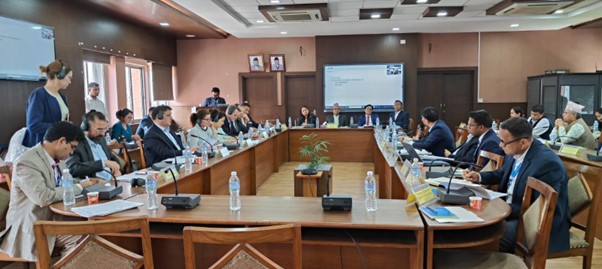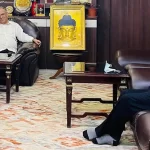Kathmandu, June 22 :
(Narayan Neupane)
A big portion of foreign assistance meant for the programme to strengthen democratic system and to enhance capacity for governance improvement remains to be spent.
This situation has arisen in the Provincial and Local Governance Support Programme (PLGSP) as the province and local levels failed to give adequate concern and attention, it is said. The PLGSP is run under the Ministry of Federal Affairs and General Administration and it is the main national project of the government focussed on promoting federal good governance.
PLGSP commenced officially on the very first day of the Nepalese fiscal year 2076/77 (16 July 2019) for a duration of four years. PLGSP was formally launched at the Cabinet meeting when the project document was approved on 23 August 2019. A Joint Financing Arrangement (JFA) was signed between the Ministry of Finance and Development Partners (DEID, Norway, SDC and EU) on 4 September 2019.
Of the Rs 14.95 billion mobilized for operating the programme from Fiscal Year 2076/77 to 2079/80 BS, only Rs 3 billion 238 million 700 thousand has been spent, said the National Programme Directorate Manager, Bhupendra Sapkota at a programme here on Wednesday.
It was shared in the programme that several provinces and local levels did not turn up for taking the assistance for implementation of the targeted programme within the stipulated time while some failed to utilize the funds properly even after taking the assistance. This has resulted in the programme running into arrears.
The objectives of the programme are to strengthen provincial and local governance system and procedures with an improved inter-governmental relationship to maximize benefits of cooperative federalism for Nepali citizenry and to enhance the capacity of provincial and local governments to deliver services and development outcomes effectively to citizens.
Similarly, the major activities of the project are to prepare policy, laws, strategies, directives and guidelines for federal governments, Provincial and the local governments, and to strengthen inter-governmental mechanisms for full functioning. Establishing and strengthening the Provincial Center for Good governance (PCGG (re-structured LDTA regional training center) at the province as a center for excellence to drive the overall capacity development activities for the local governments is also one of PLGSP’s activities.
The government has provided Rs 3 billion and 450 million while Nepal’s development partners as the United Nations, the European Union and Norway among others Rs 11 billion 500 million as grant for PLGSP. Of this amount, Rs 1 billion 897 million 500 thousand was allocated to the federal government, Rs 7 billion and 222 million to the provincial governments and Rs 5 billion 830 million and 500 thousand to the local governments.
The programme envisaged 14 different outcomes including formulation of Acts and policies required for the new federal structures and the strengthening of inter-governmental mechanism and public finance management. It particularly aims to make the government bodies at all levels and the inter-governmental mechanisms fully functional to support the federal governance system as per the Constitution.
A latest meeting of the National Implementation Committee and National Fiscal Risk Advisory Sub-committee, chaired by the Ministry Secretary, made an assessment of the achievements of the PLGSP so far and the initiatives made to achieve these outcomes. The meeting also pledged to put in maximum efforts for making the programme result-oriented in the coming days.
Sapkota said the meeting held extensive and intense discussions on implementation of its decisions and future action plan, the progress report of the current period, the proposed budget and programmes for the upcoming fiscal year and on the monitoring and evaluation report presented by the third party.
The meeting concluded that the coming year would be taken as the transitional year in the context of a big chunk of the support amount remaining to be spent even though the programme implementation term is about to terminate. Then after, the PLGSP’s new action plan and framework would be determined on the basis of wide-ranging discussion with the stakeholders.
(RSS)




